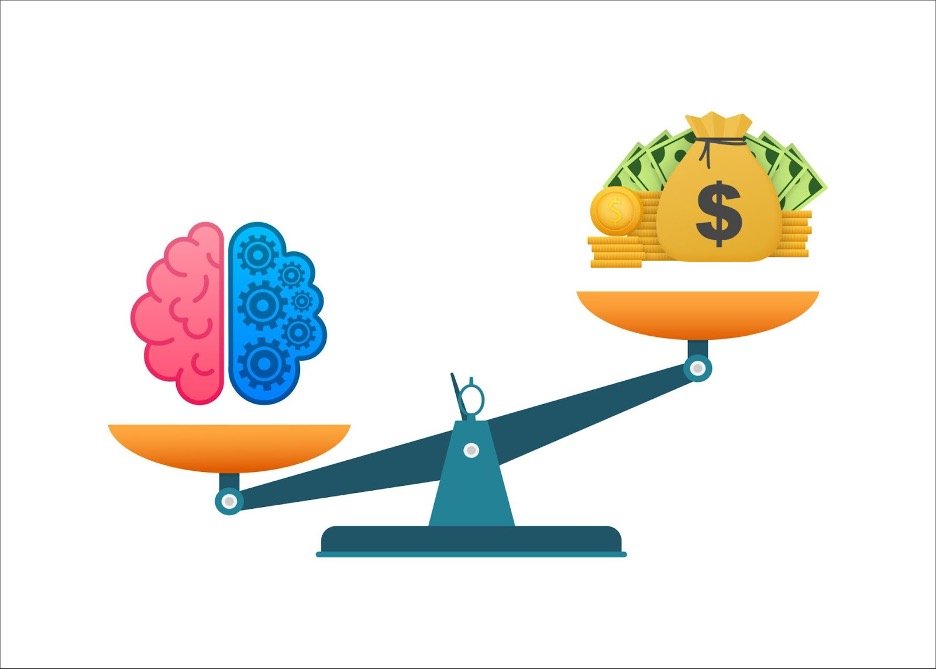Financial Advisor in Raleigh NC: Mental Health and Money
The intersection of mental health and money presents a significant challenge. This relationship is intricate, involving various factors that may seem entirely beyond your influence. You might not have realized the extent to which money and mental health have already affected you. However, they could be influencing your decision-making, physical well-being, and even your behaviors, albeit subtly.
Money and Human Behavior
Even individuals who don't face mental health challenges are susceptible to making impulsive financial decisions driven by emotions that ultimately do not benefit them. Our current state of mind heavily influences how we respond to various situations.
Buying things, like a new phone or candy, can make us feel happy for a little while. The mere act of adding an item to a shopping cart, whether physical or virtual, triggers a surge of happiness due to the release of dopamine and endorphins.
The brain produces even more of these chemicals when we physically hand over cash, make contactless payments using our phones or credit cards, or click the final "Place Your Order" button to complete a transaction. Unfortunately, this can lead to impulsive shopping sprees or acquiring items that are beyond our financial means or unnecessary. When we think about human behavior, money plays a big role. It shapes how we think, feel, and act — for better or for worse.
Money Hurts
At times, financial difficulties can contribute to feelings of depression. Researchers have established a direct correlation between factors like job loss or unexpected expenses (e.g., car repairs or medical bills) and poor mental health.
A study even discovered a noteworthy connection between debt and mental disorders. This connection is not unfounded; financial stress tends to make us feel more powerless and overwhelmed. Moreover, money problems often strain relationships, which can further exacerbate feelings of depression.
Both scenarios—where mental health impacts finances and vice versa—can hinder overall financial well-being. This encompasses how well you manage and perceive aspects such as budgeting, debt, saving, and protective measures.
Overcoming Money Struggles
It's completely understandable to feel concerned about covering expenses during unexpected emergencies. If the financial impact of unforeseen bills or emergencies is causing you distress, building up an emergency fund can provide peace of mind.
If you haven't already established an emergency fund, now is an opportune moment to start. Begin by opening a dedicated bank account and strive to save an amount equivalent to three to six months' worth of expenses. By doing so, you will be better prepared financially to handle any unexpected costs that may arise.
One of the best tools to fight against the symptoms of poor mental health is to practice self-care. Building a self-care routine is about creating time and space for the things you need, the things you want, and the things that make you feel good. Once you start making time for yourself, you may find that you are better equipped to make serious financial decisions.
Consider creating a budget if you haven't already done so. A budget can promote accountability for your expenses and provide a clearer picture of your financial situation. Additionally, it may be beneficial to seek guidance from both a mental health professional and a financial advisor who can assist you in moving forward.
Get Help
Regardless of whether mental health issues or money problems came first, there are effective ways to enhance your financial well-being and reduce financial stress. The first step is to acknowledge your emotional connection with money.
Take a moment to reflect on your purchases from the past two weeks, whether they were planned or spontaneous. Consider the range of emotions you experienced before, during, and after making those purchases.
What was my emotional state? Was I feeling sad or anxious about something?" By doing so, you can identify any specific emotions that may be driving impulsive or unplanned spending.
It's important to remember that what you're going through is common, and there's no need to feel embarrassed. If you constantly berate yourself for past financial choices, you're only perpetuating harm. Instead, have faith in yourself and your capacity to bring about positive change.
Before making any purchase, take a moment to pause and reflect on your decision. Mindful consideration has been proven by research to enhance decision-making and overall well-being.
Bottom Line
The state of your finances and your mental well-being are closely connected. By avoiding unnecessary financial problems, you decrease the likelihood of experiencing mental health issues.
Sources:
https://www.fidelity.com/learning-center/smart-money/money-and-mental-health
https://www.rategenius.com/mental-health-and-money
Disclosures:
This site may contain links to articles or other information that may be on a third-party website. Advisory Services Network, LLC is not responsible for and does not control, adopt, or endorse any content contained on any third-party website.
This material is provided as a courtesy and for educational purposes only. Please consult your investment professional, legal or tax advisor for specific information pertaining to your situation.
These are the views of the author, not the named Representative or Advisory Services Network, LLC, and should not be construed as investment advice. Neither the named Representative nor Advisory Services Network, LLC gives tax or legal advice. All information is believed to be from reliable sources; however, we make no representation as to its completeness or accuracy. Please consult your Financial Advisor for further information.





